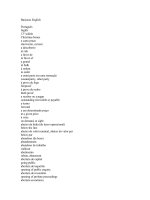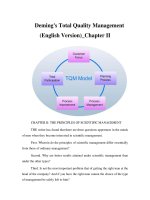ENGLISH 9
Bạn đang xem bản rút gọn của tài liệu. Xem và tải ngay bản đầy đủ của tài liệu tại đây (110.36 KB, 3 trang )
<span class='text_page_counter'>(1)</span><div class='page_container' data-page=1>
<b>UNIT 6. LESSON 3: LISTEN</b>
Period 39
<b>A. OBJECTIVES : </b>
By the end of this lesson, Ss will be able to listen for details to complete the
notes about the ocean pollution.
Knowledge: Listen to the report on how our oceans are polluted.
Skills: listening and writing skills development
Attitude: Ss know how to protect the environment.
<b>B.TEACHING AIDS:</b>
Lesson plans, Tieng Anh 9, chalk, real situations, projector, computer speaker
<b>C. METHODS:</b>
Jumbled words, prediction, retelling
<b>D. CONTENTS</b>. <b> </b>
<b>I. Organization</b>
<b>Class Date of teaching </b>
<b>Absent Ss</b>
<b>9D1</b> ………..
……….
<b>9D2</b> ………..
……….
9D3
<b>Teacher & Ss’activities</b>
<b>II. Warm-up (5’)</b>
<i><b>Jumbled words</b></i>
Group work
1. opnitilulo = pollution
2. mpud = dump
3. iar = air
4. sptesecidi = pesticides
5. psary = spray
<b>III. New lesson </b>
<b>Step 1: Pre- listening (12’)</b>
- Ss guess meaning of new words.
- Ss listen and repeat in chorus and individually
- Ss copy down in their notebook.
T checks new words by: “Slap the board”
<b> * Set the sence:</b>
- Short discussion: How the Ocean is polluted? /
What makes the Ocean polluted?
<b>* Prediction: </b>
- Ask students to predict 4 things that make the
ocean polluted.
Eg: garbage, ………
<b>Content </b>
1. opnitilulo = pollution
2. mpud = dump
3. iar = air
4. sptesecidi = pesticides
5. psary = spray
<b>1.Vocabulary </b>
Oil leak (n) ro ri dau
Raw sewage (n): nước thải chưa qua
xử lí
- Oil spills (n): tràn dầu
- Marine life (n): loài thủy sinh
- Waste materials (n): vật liệu phế thải
- Regulations(n): nội quy
- “What pollutes the oceans?
<b>2. Listening </b>
</div>
<span class='text_page_counter'>(2)</span><div class='page_container' data-page=2>
- Call on some Ss to report their ideas and write
on the board.
<b>Step 2. While- listening (17’)</b>
Activity 1: listen and check:
Set the scene “You are going to listen to a report
on how our oceans are polluted. Study the notes
carefully then listen to the tape
- Turn on the tape
- Ask Ss to compare the answers with their
friends.
- Call on some Ss to read aloud the answers, and
give the correct answers:
Activity 2: Listen and complete the note
- T asks ss to work individually to listen to the
report on how our oceans are polluted then
complete the notes.
- Ss listen again and complete the notes
- Ss compare with their partner.
- Students listen for the third time to check their
task
- T checks with the whole class.
<i><b>Tapescript:</b></i>
<i>Our oceans are becoming extremely polluted. </i>
<i>Most of this pollution comes from the land, </i>
<i>which means it comes from people. Firstly, there</i>
<i>is raw sewage, which is pumped directly into the </i>
<i>sea. Many countries, both developed and </i>
<i>developing, are guilty of doing this. Secondly, </i>
<i>ships drop about 6 million tons of garbage into </i>
<i>the sea each year. Thirdly, there are oil spills </i>
<i>from ships. A ship has an accident and oil leak </i>
<i>from the vessel. This is not only pollutes the </i>
<i>water, but it also kills marine life. Next, there </i>
<i>are waste materials from factories. Without </i>
<i>proper regulations, factoty owners let the waste </i>
<i>run directly into the rivers, which then leads to </i>
<i>the sea. And finally, oil is washed from the land. </i>
<i>This can be the result of carelessness or a </i>
<i>deliberate dumping of waste.</i>
<b>Step 3: Post- listening (8’</b>
- Retell story
Ss work in groups to talk about reasons that cause
ocean pollution.
<b>-Eg: ~ Waste materials come from factories…</b>
into the sea .
<b>Secondly : Garbage is dropped into </b>
<b>the sea .</b>
<b>Thirdly : oil spills come from ships at </b>
sea .
<b>Next : Waste materials come from </b>
factories .
<b>Finally : Oil is washed from the </b>
land .
- Raw sewage
- Garbage
- Oil spills
- Waste materials
Most of our electricity now comes
from coal, gas, oil, or nuclear power.
The sun could provide this power so
many countries are already using
energy. Only one percent of the solar
energy that gets to the Earth can
provide enough power for the work’s
population. Solar energy is a cheap,
clean effective source of power that
doesn’t cause pollution or waste
natural resources.
There’s an advanced solar energy
program in Sweden. It is said that by
the year of 2015, all building in
</div>
<span class='text_page_counter'>(3)</span><div class='page_container' data-page=3>
<b>IV. Summary (2’) </b>
- Teacher summarizes the whole lesson and
emphasizes on the important points.
- Retells what they have leant in short.
<b>V. Homework (1’)</b>
- Leanr new words by heart.
- Do exercise 3/P.42 (WB)
- Prepare Unit 6 - Read
</div>
<!--links-->









